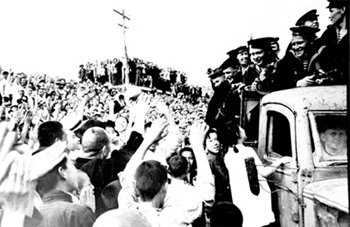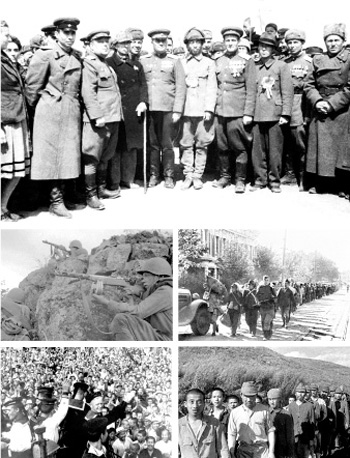Friendly Ties between Joseon and Russia during Korean Independence Movement
 Following is a contribution by Victor Balashow, counselor of science and education at the Embassy of The Russian Federation, on behalf of the embassy in Korea for the 100th anniversary of Japan¡¯s forced annexation of Korea. The article was based on the presentations made during the ¡°Roundtable of Friendly Ties between Joseon and Russia Toward Korean Independence Movement¡± held in Seoul on April 15 ¡ª Ed.
Following is a contribution by Victor Balashow, counselor of science and education at the Embassy of The Russian Federation, on behalf of the embassy in Korea for the 100th anniversary of Japan¡¯s forced annexation of Korea. The article was based on the presentations made during the ¡°Roundtable of Friendly Ties between Joseon and Russia Toward Korean Independence Movement¡± held in Seoul on April 15 ¡ª Ed.
The year 2010 marks the 100th anniversary of Japan¡¯s forced annexation of Korea and Ahn Jung-geun¡¯s shooting of Japanese governor-general Ito Hirobumi. Despite it being a relatively shameful period for Korea, the monumental history of 100 years will likely provide opportunities to attract attention from historians of Korea and other countries with regard to Korea¡¯s loss of sovereignty and the advance of major power nations onto the Korean Peninsula.
Though some historians seek to explore new facts by reinterpreting past incidents, such attempts have sometimes lacked a reasonable basis. Rather, there have been many cases of distorting history in favor of political interests.
The book titled ¡°Independence struggle by Koreans in Russia for the period 1905-1919,¡± written by Boris Park, deals with facts that have remained unexplored so far. The author details the friendly relations between the people of Joseon and Russia by utilizing records and documents that have remained thus far unknown.
Russia-Japan War and Joseon
The formation of an alliance between Korea and Russia against Japan was triggered by the Russia-Japan War of 1904-1905.e In the aftermath of the war, Japan coerced Korea to sign a ¡®Korea-Japan Protocol Agreement¡¯ on Feb. 24, 1904, forcing Joseon to provide military assistance to Japan. With this, Japan also acquired the rights to utilize the Korean Peninsula for military purposes in its fight against Russia. On May 19, Japan also pressed the Joseon emperor to nullify all treaties signed between Joseon and Russia.
But despite Japan¡¯s employment of propaganda against Russia, the Joseon people backed Russia during the war period. This was because Russia stood behind the Joseon people in their bids to oppose Japan¡¯s rule over the Korean Peninsula. Joseon¡¯s emperor also supported Russia at that time.
There are many documents in Russia¡¯s libraries proving the Korean people who resided in the northern area of Joseon supported the Russian army and were poised to deploy an anti-Japan war.
In June 1904, a Korean unit was established under the command of Gen. Anisinov for military operations in the northern area of the Korean Peninsula. Some 100 Korean volunteers took part in the military operations against Japan at the instruction of the Joseon emperor. Many of them were honored by the Russian government after the war.
Japan¡¯s forced annexation of Korea and the resistance of Korean people in Russia. On Aug. 17, 1904, a partisan unit made of Jeoson volunteers in joint operation with Russian military units fought against Japanese forces. A number of the Jeoson volunteer soldiers won the Soviet Union medals for their courage in fighting Japanese soldiers. Through these incidents, one can see the seeds for amicable Korea-Russia relations growing from way back then.
Russia¡¯s defeat in the war against Japan consequently provided Japan with a decisive opportunity to acquire Joseon over the previous decades. And on Aug. 22, the most tragic accident in Korean history took place: the annexation of Korea by Japan.
The Japanese annexation at the time gave a great disappointment to Jeoson people. A.S. Somov, who was the Russian counselor in Seoul, recorded that many Joseon people killed themselves at the news deeply grieved and saddened by the Japanese move. He wrote that ¡°today, I heard the governor of Jeolla province took his own life.¡± What was moe tragic was the then Jeoson counsel in St. Petersburg, Lee Bum-jin, killed himself over the traumatic news.
The Soviet Russia participated in the war against Japan only six days before the Imperial Japanese surrender on Aug. 15. The Soviet Far East army disarmed the Japanese Kwantung army in Manchuria. U.S. President Harry Truman wanted the Soviet Russia to fight the Japanese army in Manchuria, misjudging its strength, to minimize the sacrifice of U.S. soldiers. The Soviet Army entered the Korean Peninsula in three days after the Soviet Russia¡¯s declaration of war against Japan. The United States wanted the Soviet army not to cross the 38th parallel as the U.S. army will disarm the Japanese forces in
in the areas below the 38th parallel. The Soviet Union did not have any intention to divide up the Korean Peninsula and communize the North at the time.
In the meantime, Joseon¡¯s volunteer forces began to pick up in the Vladivostok area of Russia led by Lee Beom-yoon, who initiated Joseon¡¯s struggle against Japan. In the Far East of Russia dozens of newspapers were published by Joseon¡¯s independence fighters to inform the readers of the truth about Japan¡¯s colonial rule and enlighten them on the significance of national consciousness.
We can find many cases of friendly ties between Korea and Russia in various areas like military, which proves the fact that the two nations have developed bilateral relations based on mutual respect for their patriotism and national consciousness.
Japan triggered a tragedy in East Asia including Korea, China, Mongolia and the Philippines during World War II as well as globally by siding with the German fascist regime. Despite a conclusive judgment on Japan¡¯s war atrocities during World War II, there has not been clarity regarding Japan¡¯s criminal behavior on the Korean Peninsula, according to scholars and experts.
Though Japan has acknowledged its past misdeeds, it should have clarified its wrongdoings on Korea from the perspective of international laws and norms. As many decades have passed, there is little possibility of the survival of top Japanese officials who played decisive roles during the occupation period. But we may consider a court trial of Japanese criminals in Korea for a definite legal judgment on the responsible figures.
Liberation of Joseon
The Joseon people engaged in a strenuous struggle to regain its independence. But the nation could not get the liberation it sought until the end of World War II when the Japanese troops withdrew from the Korean Peninsula. The Russian army made a great contribution to Joseon¡¯s retaining of its sovereignty by fighting the Japanese soldiers in the far East border area. But regrettably, however, the relations between Russia and Korea could not progress due to the global historical trend that led to the division of the Korean Peninsula over the past six decades.
But, fortunately, the two nations have begun to expand bilateral cooperation in various areas like agriculture and aerospace since setting up diplomatic ties some 20 years ago. Joseon received Russia as its faithful friend and comrade more than 100 years ago in the process of recovering its sovereignty and the two nations are joining hands toward peace and mutual prosperity in the 21st century. nw
A book, titled ¡°Independence struggle by Koreans in Russia for the period 1905-1919,¡± written by Boris Park, details the friendly relations between the people of Joseon and Russia by utilizing records and documents that have remained thus far unknown. (Courtesy on the Russian Embassy)
There are many documents in Russia¡¯s libraries proving the Korean people who resided in the northern area of Joseon supported the Russian army and were poised to deploy an anti-Japan war. (Courtesy on the Russian Embassy)
3Fl, 292-47, Shindang 6-dong, Chung-gu, Seoul, Korea 100-456
Tel : 82-2-2235-6114 / Fax : 82-2-2235-0799